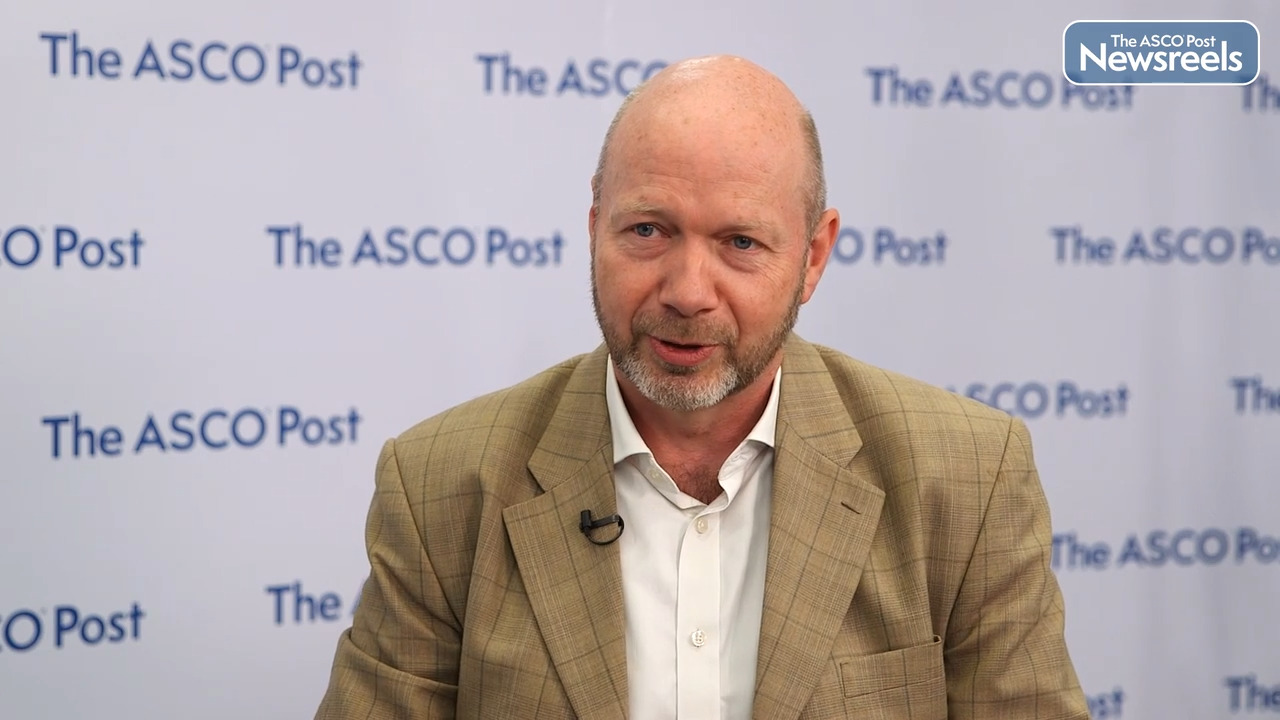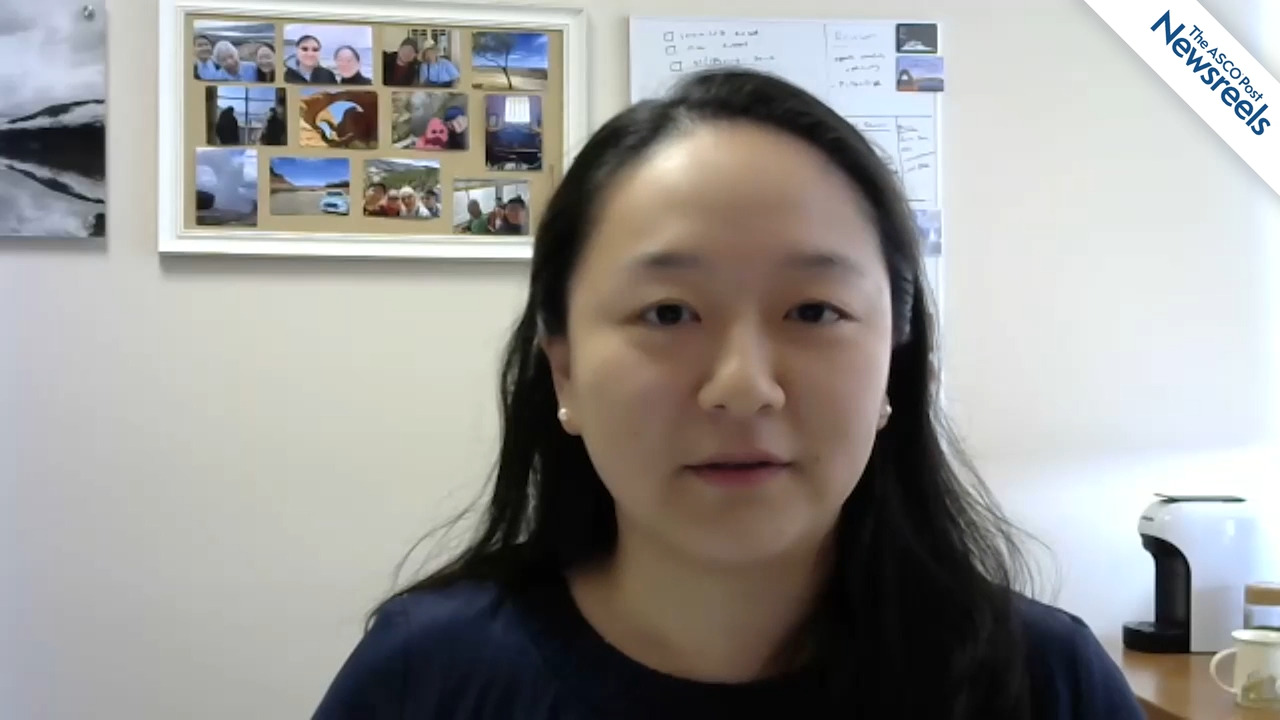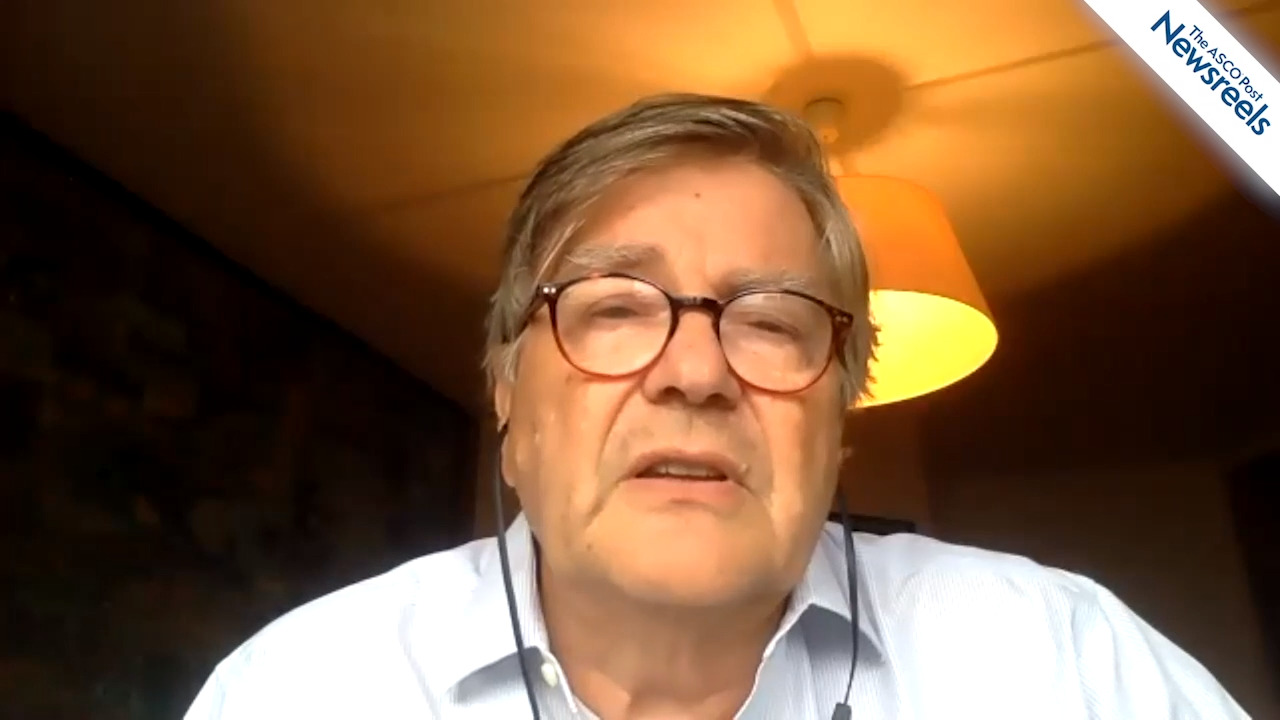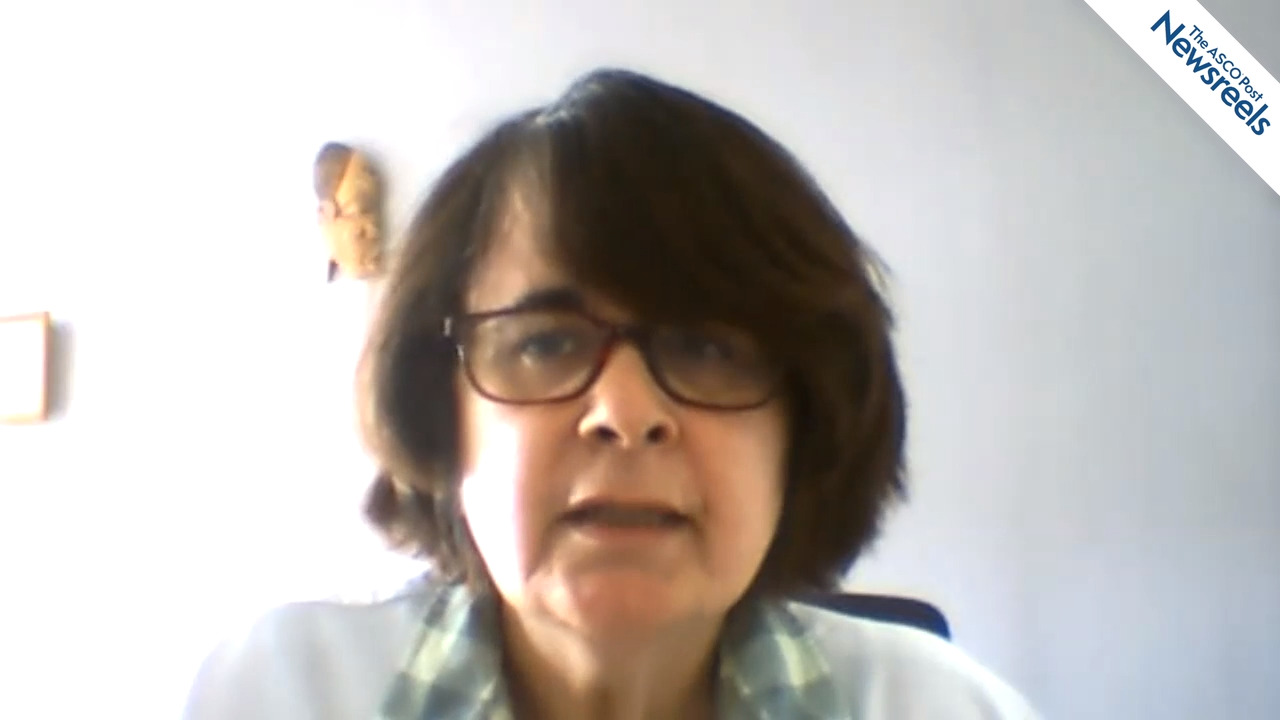Comparison of Two Chemotherapy Regimens for Newly Diagnosed Ewing Sarcoma
As reported in The Lancet by Brennan et al, the European phase III EURO EWING 2012 trial found improved event-free survival with a standard U.S. chemotherapy regimen vs a standard European regimen in newly diagnosed patients with Ewing sarcoma. As stated by the investigators, “Internationally, a...
Shorter Course of Hypofractionated Radiation Therapy Yields Comparable Results to Conventional Radiotherapy for Patients With Nonmetastatic Soft-Tissue Sarcoma
Patients with nonmetastatic soft-tissue sarcoma who need preoperative radiation therapy can safely receive hypofractionated treatment for 3 weeks instead of 5 weeks, with comparable tumor control and no increased risk of major complications in wound healing, according to a new study published by...
Prevalence of and Risks for Thoracic Soft-Tissue Sarcomas in Breast Cancer Survivors
In a retrospective cohort study reported in The Lancet Oncology, Veiga et al found that receipt of radiotherapy was the strongest risk factor for development of thoracic soft-tissue sarcomas in U.S. breast cancer survivors; both hypertension and diabetes were significant risk factors for...
Cabazitaxel in Advanced Dedifferentiated Liposarcoma
In a phase II EORTC Soft-Tissue and Bone Sarcoma Group trial reported in JAMA Oncology, Sanfilippo et al found that cabazitaxel showed activity in locally advanced, inoperable, or metastatic dedifferentiated liposarcoma. Study Details In the trial, 38 evaluable patients who had received no more...
Durvalumab/Tremelimumab for Previously Treated Patients With Advanced Soft-Tissue and Bone Sarcomas
In a single-center phase II trial reported in The Lancet Oncology, Somaiah et al found that the combination of durvalumab and tremelimumab showed activity in a group of previously treated patients with advanced or metastatic soft-tissue and bone sarcomas of various subtypes. Study Details In the...
Evaluating Strategies for Treating Pediatric Metastatic Rhabdomyosarcoma
In a report in the Journal of Clinical Oncology, Schoot et al provided findings from the European Paediatric Soft Tissue Sarcoma Study Group MTS 2008 and pooled findings of MTS 2008 with those of the concurrent BERNIE study, both of which evaluated strategies for the treatment of pediatric...
Addition of Trabectedin to Doxorubicin in the First-Line Treatment of Advanced Leiomyosarcoma
In the French phase III LMS-04 trial reported in The Lancet Oncology, Pautier et al found that the addition of trabectedin to doxorubicin significantly prolonged progression-free survival as first-line treatment for patients with unresectable or metastatic leiomyosarcoma. Study Details In the...
First Randomized Chemotherapy Study in Relapsed or Refractory Ewing Sarcoma Reports Modest Gains in Survival With High-Dose Ifosfamide
High-dose ifosfamide extended event-free and overall survival in patients with recurrent or primary refractory Ewing sarcoma compared with other commonly used chemotherapy regimens, according to the results of a randomized trial reported at the 2022 ASCO Annual Meeting by lead author Martin...
Martin McCabe, PhD, on Ewing Sarcoma: Assessment of Topotecan, Cyclophosphamide, and High-Dose Ifosfamide
Martin McCabe, PhD, of the University of Manchester, discusses a phase III assessment of chemotherapy for patients with recurrent and primary refractory Ewing sarcoma. The trial, called rEECur, is the first study to provide comparative toxicity and survival data for the four most commonly used chemotherapy regimens in this disease. The analysis showed that high-dose ifosfamide is more effective in prolonging survival than topotecan plus cyclophosphamide (Abstract LBA2).
Neoadjuvant Immunotherapy May Improve Survival for Patients With Soft-Tissue Sarcoma
In a phase II clinical trial, immune checkpoint blockade before surgery was associated with favorable responses and outcomes in undifferentiated pleomorphic sarcoma (UPS) and recurrent dedifferentiated liposarcoma (DDLPS), Keung et al reported at the 2022 ASCO Annual Meeting (Abstract LBA11501)....
Study Finds High-Dose Ifosfamide Superior to Other Standard-of-Care Treatments in Recurrent and Primary Refractory Ewing Sarcomas
Use of high-dose ifosfamide was found to be superior for treating recurrent and primary refractory Ewing sarcomas compared with three other standard-of-care treatments used for the disease, according to research presented by McCabe et al during the Plenary Session at the 2022 ASCO Annual Meeting...
Addition of High-Dose Treosulfan and Melphalan to Consolidation in High-Risk Ewing Sarcoma
In a phase III trial (Ewing 2008R3) reported in the Journal of Clinical Oncology, Koch et al found that the addition of treosulfan and melphalan high-dose chemotherapy (TreoMel-HDT) followed by reinfusion of autologous hematopoietic stem cells to consolidation did not improve event-free survival vs ...
Selinexor in Previously Treated Advanced Dedifferentiated Liposarcoma
In the phase II/III SEAL trial reported in the the Journal of Clinical Oncology, Gounder et al found that selinexor significantly improved progression-free survival and time to subsequent treatment in previously treated advanced dedifferentiated liposarcoma, with the greatest benefit observed in...
Addition of Carotuximab to Pazopanib in Advanced Angiosarcoma
In the phase III TAPPAS trial reported in JAMA Oncology, Jones et al found that the addition of carotuximab to pazopanib did not improve progression-free survival in patients with advanced angiosarcoma. Carotuximab is an IgG1 antibody that binds endoglin, which is highly expressed on proliferating...
PD-1 Inhibition in Patients With Classic or Endemic Kaposi Sarcoma
In a French phase II study reported in The Lancet Oncology, Delyon et al found that pembrolizumab produced a high response rate in patients with classic or endemic Kaposi sarcoma with progressive cutaneous extension requiring systemic treatment. As stated by the investigators, “Although the...
Researchers Identify Trends in Treatment for Retroperitoneal Soft-Tissue Sarcoma
Researchers have published an analysis of strategies for treating retroperitoneal soft-tissue sarcoma, which has historically been understudied due to its rarity. The researchers say the trends they identified—particularly the convergence of certain treatments across centers—will help guide the way ...
The Virtues of Ruth: Gratitude, Advocacy, and Service
I still remember having to sit down with her three siblings on that afternoon. It was drizzling, cloudy, and cool—Mother Nature in agreement with the heaviness of what had just taken place. I held them tight. I knew the words I would utter next would change their lives forever. I paused for 10...
Antibiotics After Endoprosthetic Reconstruction for Lower-Extremity Bone Tumors: Comparison of Two Intravenous Regimens
In a study reported in JAMA Oncology, researchers in the Prophylactic Antibiotic Regimens in Tumor Surgery Investigators group found that 5 days vs 1 day of postoperative intravenous antibiotic prophylaxis did not reduce the incidence of surgical site infection and was associated with more...
Sirolimus Protein-Bound Particles for Malignant Perivascular Epithelioid Cell Tumor
On November 22, 2021, sirolimus protein-bound particles for injectable suspension (albumin-bound) was approved for treatment of adults with locally advanced unresectable or metastatic malignant perivascular epithelioid cell tumor.1 Supporting Efficacy Data Approval was supported by findings in the...
Emily Z. Keung, MD, on Interactions of Sarcoma, Immune Infiltrates, and Checkpoint Blockade
Emily Z. Keung, MD, of The University of Texas MD Anderson Cancer Center, discusses the complex interactions of immune infiltrates and neoadjuvant immune checkpoint blockade (ICB) in patients with resectable soft-tissue sarcoma. These interactions may hold the key to understanding pathologic response to ICB and ICB resistance (Abstract 379).
From Cancer Survivor to Citizen Astronaut
When I was diagnosed with osteosarcoma of my left femur nearly 20 years ago, I remember telling my parents that I didn’t want to die. The diagnosis was terrifying because all the people I knew who had cancer had passed away, and I thought this cancer would kill me, too. That evening, my dad went...
Addition of Vincristine, Topotecan, and Cyclophosphamide to Five-Drug Interval-Compressed Chemotherapy for Ewing Sarcoma
As reported in the Journal of Clinical Oncology by Leavey et al, the phase III Children’s Oncology Group AEWS1031 trial showed no improvement in event-free or overall survival with the addition of vincristine, topotecan, and cyclophosphamide (VTC) to standard five-drug interval-compressed...
Risk-Based Treatment of Pediatric and Young Adult Synovial Sarcoma
In a report from the Children’s Oncology Group ARST0332 study published in the Journal of Clinical Oncology, Venkatamani et al found that risk-based treatment of pediatric and young adult patients with synovial sarcoma produced favorable outcomes in those with nonmetastatic disease. Outcomes in...
Activity of Nab-sirolimus in Malignant Perivascular Epithelioid Cell Tumors
In the phase II AMPECT trial reported in the Journal of Clinical Oncology, Wagner et al found that the mTOR inhibitor nab-sirolimus produced a substantial rate of durable responses and a high disease control rate in patients with malignant perivascular epithelioid cell tumors. As stated by the...
Combination of Lenvatinib and Etoposide/Ifosfamide for Relapsed or Refractory Osteosarcoma
In the phase I/II ITCC-050 trial reported in The Lancet Oncology, Gaspar et al found that the combination of lenvatinib with etoposide/ifosfamide showed antitumor activity, including good progression-free survival outcomes, in patients with relapsed or refractory osteosarcoma. Study Details...
Small Study Evaluates Combination Ipilimumab/Nivolumab in Patients With Angiosarcoma
In a small study of 16 patients with angiosarcoma published by Michael Wagner, MD, and colleagues in the Journal for ImmunoTherapy of Cancer, 4 patients experienced a partial or complete response to treatment with a combination of the immunotherapies ipilimumab and nivolumab, and another 2 patients ...
VOYAGER Trial: Avapritinib vs Regorafenib in Molecularly Unselected Previously Treated Advanced GIST
As reported in the Journal of Clinical Oncology by Yoon-Koo Kang, MD, and colleagues, the phase III VOYAGER trial showed no improvement in progression-free survival with avapritinib vs regorafenib as third- or later-line treatment of patients with molecularly unselected, locally advanced,...
Vincristine/Irinotecan With or Without Temozolomide for Relapsed or Refractory Rhabdomyosarcoma
In a European phase II trial (VIT-0910) reported in the Journal of Clinical Oncology, Defachelles et al found that the combination of vincristine/irinotecan with vs without temozolomide produced better outcomes—albeit with increased toxicity—in children and adults with relapsed or refractory...
ASTRO Issues New Clinical Guideline on Radiation Therapy for Adult Patients With Soft-Tissue Sarcoma
A new clinical guideline from the American Society for Radiation Oncology (ASTRO) published by Kilian E. Salerno, MD, and colleagues in Practical Radiation Oncology provides guidance on the use of radiation therapy to treat adult patients with soft-tissue sarcomas. Recommendations outline optimal...
Addition of Prime-Boost Vaccination Regimen to Atezolizumab in Soft-Tissue Sarcomas Expressing NY-ESO-1
In a phase II trial reported in the Journal of Clinical Oncology, Sant P. Chawla, MD, and colleagues found that the addition of the heterologous prime-boost vaccination regimen CMB305 to atezolizumab did not improve survival outcomes in patients with soft-tissue sarcomas expressing the...
Predicting Survival in Patients With Extremity and Trunk Sarcomas in the United States
An examination of the online nomogram Sarculator demonstrated it is as effective at predicting overall survival of certain patients with sarcoma in the United States as it is in Europe, according to research presented by Voss et al at the Society of Surgical Oncology 2021 International Conference...
FDA Pipeline: Priority Reviews for Immunotherapies in Gastric Cancers, Anal Cancer
The U.S. Food and Drug Administration (FDA) recently granted Priority Review to nivolumab as either adjuvant or first-line therapy in several types of gastric cancers, as well as to a novel PD-1 inhibitor for locally advanced or metastatic squamous cell carcinoma of the anal canal. The FDA also...
Addition of Gemcitabine to Pazopanib for Refractory Soft-Tissue Sarcoma
In the German phase II PAPGEMO trial reported in JAMA Oncology, Hans-Joachim Schmoll, MD, PhD, and colleagues found that the combination of pazopanib and gemcitabine improved 12-week progression-free survival vs pazopanib alone in patients with anthracycline- or ifosfamide-refractory soft-tissue...
Progress Report on Checkpoint Inhibitors in Rare Tumors
Immune checkpoint inhibitors may prove to be effective in treating patients with two rare cancer types—leptomeningeal metastases and angiosarcoma, according to early-phase clinical trials reported at the 2020 Annual Meeting of the Society for Immunotherapy of Cancer (SITC), which was held virtually ...
Complexity of Designing Clinical Trials for Sarcoma: Shifting Focus to Constellation of Subtypes
Sarcoma has bedeviled researchers for many years because of its heterogeneity. Sarcoma encompasses more than 100 different subtypes, which makes it difficult to design studies to identify effective therapies. As researchers dig deeper into the constellation of subtypes of sarcoma, some therapies...
Preoperative Radiotherapy Dose Reduction in Patients With Myxoid Liposarcoma
In the phase II DOREMY trial reported in JAMA Oncology, Lansu et al found that a reduction in preoperative radiotherapy dose was effective and associated with reduced morbidity in patients with myxoid liposarcoma. A stated by the investigators, “Currently, preoperative radiotherapy for all...
Tazemetostat in Patients With Advanced Epithelioid Sarcoma and Loss of INI1/SMARCB1
As reported in The Lancet Oncology by Mrinal Gounder, MD, and colleagues, findings in a cohort of a phase II basket trial showed that the oral EZH2 inhibitor tazemetostat produced durable responses in some patients with advanced epithelioid sarcoma with loss of INI1 or SMARCB1 (the gene encoding...
Matti S. Aapro, MD, on Curing Sarcomas: An Expert Review
Matti S. Aapro, MD, of the Genolier Cancer Center, reviews the state of the science in sarcoma treatment: specialized surgery, disease diversity, emerging therapies, and the diagnostic approach to soft-tissue disease.
Does Pembrolizumab Monotherapy Demonstrate Benefit in Rare Sarcomas?
Pembrolizumab monotherapy induced responses in patients with rare sarcomas that varied by histotype, according to findings presented by Jean-Yves Blay, MD, at the ESMO Virtual Congress 2020 (Abstract 1619O). Methods Dr. Blay presented first results from a cohort of patients with rare sarcomas in...
Surgery With or Without Preoperative Radiotherapy for Primary Retroperitoneal Sarcoma
As reported in The Lancet Oncology by Bonvalot et al, the phase III EORTC-62092 (STRASS) trial showed that the addition of preoperative radiotherapy to surgery did not improve abdominal recurrence–free survival in patients with primary retroperitoneal sarcoma. Study Details In the open-label trial, ...
First-Line Pazopanib vs Doxorubicin in Patients Aged 60 or Older With Metastatic Soft-Tissue Sarcoma
In a German Intergroup phase II study reported in the Journal of Clinical Oncology, Grünwald et al found that progression-free survival with first-line pazopanib was noninferior to doxorubicin in patients aged 60 years or older with inoperable metastatic soft-tissue sarcoma. Pazopanib was also...
Comparing Pazopanib to Doxorubicin in Patients Aged 60 and Older With Soft-Tissue Sarcoma
Doxorubicin is a standard of care in patients with advanced inoperable soft-tissue sarcoma. In the EPAZ study, German researchers tested whether pazopanib showed comparable efficacy to doxorubicin in the first-line treatment of elderly patients with soft-tissue sarcoma. Grünwald et al reported in...
Addition of Pazopanib to Preoperative Chemoradiotherapy in Children and Adults With Soft-Tissue Sarcoma
In an interim analysis of a joint Children’s Oncology Group and NRG Oncology phase II trial (ARST1321) reported in The Lancet Oncology, Aaron R. Weiss, DO, and colleagues found that the addition of pazopanib to preoperative chemoradiotherapy significantly increased the rate of pathologic...
Patricia Pautier, MD, on Leiomyosarcoma: Doxorubicin and Trabectedin for First-Line Treatment
Patricia Pautier, MD, of Institut Gustave Roussy, discusses final results of the phase II LMS-02 study, which showed the combination of doxorubicin and trabectedin to be an effective first-line therapy for patients with leiomyosarcoma, with an acceptable safety profile (Abstract 11506).
Standard vs Histology-Tailored Neoadjuvant Chemotherapy for High-Risk Soft-Tissue Sarcoma
As reported in the Journal of Clinical Oncology by Alessandro Gronchi, MD, and colleagues, final results of a phase III trial conducted by the Italian, French, and Polish Sarcoma Groups showed no disease-free or overall survival benefit with use of histology-tailored vs standard...
FDA Approves Pomalidomide for Kaposi Sarcoma
On May 14, 2020, the U.S. Food and Drug Administration (FDA) expanded the indication of pomalidomide (Pomalyst) to include treating adult patients with acquired immunodeficiency syndrome (AIDS)-related Kaposi sarcoma after failure of highly active antiretroviral therapy and those with Kaposi...
Early Signs of Activity With Immunotherapies in Low-Incidence Cancers
Immunotherapy is showing promise for patients with rare cancers, offering new treatment opportunities and clinical trials to those with previously limited options. At the 2020 ASCO-SITC Clinical Immuno-Oncology Symposium, presenters discussed the use of immunotherapy in three low-incidence cancers: ...
Outcomes in Patients With Retroperitoneal Soft-Tissue Sarcoma by Hospital Type
In a study reported in JCO Oncology Practice, Villano et al found that increased hospital surgical volume was associated with overall improved survival in patients undergoing surgery for retroperitoneal soft-tissue sarcoma. However, increased volume was associated with poorer survival in patients...
Is Ivosidenib Active in Patients With Advanced IDH1-Mutated Chondrosarcoma?
In a phase I study reported in the Journal of Clinical Oncology, William D. Tap, MD, and colleagues found that the selective mutant-IDH1 inhibitor ivosidenib produced no objective responses but resulted in durable disease control in a cohort of patients with advanced chondrosarcoma. As noted by...
Tazemetostat for Advanced Epithelioid Sarcoma
On January 23, 2020, tazemetostat was granted accelerated approval for the treatment of adults and pediatric patients aged 16 and older with metastatic or locally advanced epithelioid sarcoma not eligible for complete resection.1,2 Supporting Efficacy Data Approval was based on the finding of...




